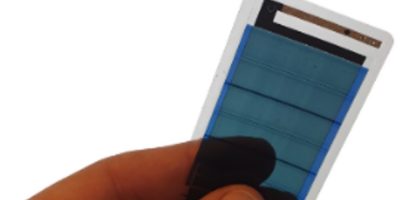Flexible cell technology eliminates disposable batteries for lighting
As the IoT continues to expand, more devices are being connected and a lot of small ones are powered by batteries. These batteries need to be replaced on a regular basis and then recycled. All of this, in addition to the manufacturing of these batteries, has a large impact on the environment and is expensive, said Epishine. It has developed a solar cell optimised for indoor use based on energy harvesting.
The light energy harvesting (LEH) modules are optimised to convert light from indoor lighting into energy enough to power small electronic devices. The Epishine LEH module are only 0.2mm thick so that they can fit into various devices without adding thickness to it. It has a bending radio of 10mm, which means the module also fits on curved surfaces. For applications that only need to be powered when there is light, like an access card or a thermometer, the LEH module can be connected more or less directly to the application, said Epis.
In applications where power is needed even when there is no light available or if the momentary power required is more than the LEH module can deliver, an energy storage solution like a small super cap or rechargeable battery can be implemented. The LEH module charges the energy storage when light is available and the storage solution power the application when needed.
The sensors communicate wirelessly for use in a variety of applications such as temperature and humidity sensors, or fire detectors.
Epishine offerss standard sizes of cells with an active area of 50 x 20mm, 50 x 30mm or 50 x 50mm.
Epishine’s LEH3 modules mainly consist of PET, a material based on hydrocarbons and which is non-toxic to the environment. It is usually the batteries that have the greatest life cycle assessment (LCA) impact in this type of electronics. Most energy harvesting applications need a small energy storage, but changing from a battery that stores energy for several years (with no energy harvesting) to something that stores days’ worth of energy, significantly improves the LCA calculation, said Epishine.
Due to the patented manufacturing method, the LEH module gains an “excellent low spread in performance”, according to Epishine. The assembling method ensures that no short circuits are created internally that could affect performance.
Epishine’s light energy harvesting modules allow users to eliminate batteries or extend the battery life of electronic devices to avoid expensive battery replacements. At the same time, it means fewer disposable batteries. Epishine says its manufacturing is scalable and it has the goal of eliminating billions of disposable batteries through light energy harvesting.
Epishine is a developer and manufacturer of printed organic solar cells, committed to reducing global environmental impact by enabling smart technologies to meet the demand for sustainable energy solutions.




